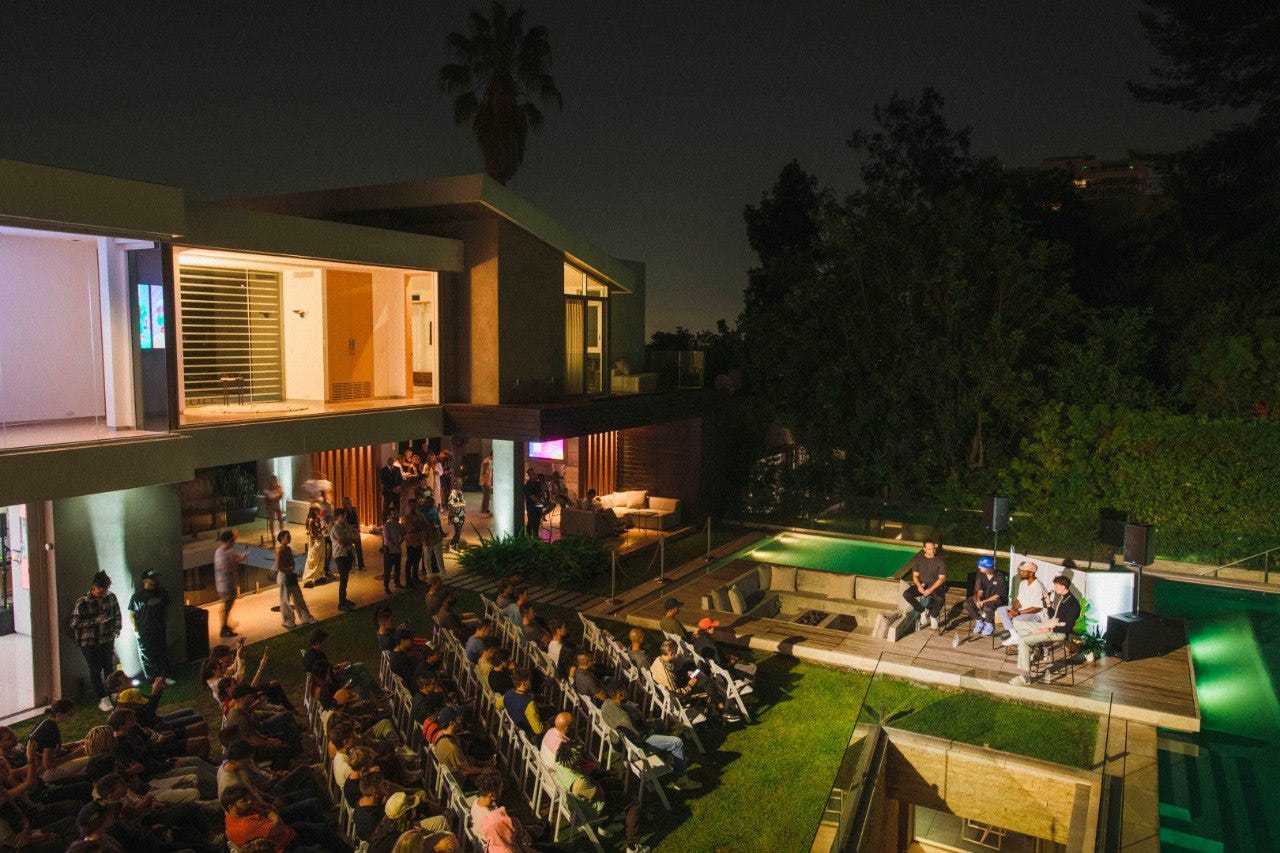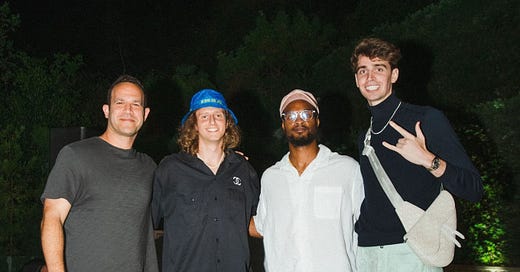Key Takeaways from Afterparty's Web3 Music Panel
Cooper Turley, Daniel Allan, Pinder, and David Fields discuss the current state of Music NFTs and Web3

A group of artists, music managers, NFT collectors, Web3 operators, and other music-loving folks gathered last night at the Afterparty House in West Hollywood to discuss the current state of Music NFTs and Web3. The gorgeous Afterparty mansion has been a weekly gathering place for people active and interested in the Web3 space to connect and collaborate.
Last night’s event featured a panel moderated by collector/operator Cooper Turley with artist/producer Daniel Allan, Venice Music’s Pinder, and Afterparty founder David Fields.
Other Web3 trailblazers spotted in the audience: Peter Saputo (artist), Alec King (artist), Katrina Arman (artist relations, Sound.xyz), Brett Blackman (manager, label owner), Yung Spielburg (research lead, Water & Music), Xander Carlson (artist, cofounder of Decent.xyz), Kevin George (artist), Jonathan Carmel (Web3 lead, Symphonic), Delfina Glover (manager), Drew Coyle (creator), JP Morgan (technologist), Eitan Schorr (manager), Queen George (artist), TK The Legend (artist), and Mija (artist).
The panel discussion provided an excellent overview of the current state of Web3 music and offered some helpful tips and encouragement for artists looking to get active in the space. I summed up some of the night's highlights for all the folks not in Los Angeles but interested in learning and tracking the scene. I encourage everyone to follow Cooper, Daniel, Pinder, David, and Afterparty on Twitter to share ideas and continue the conversation.
Key takeaways from last night’s panel:
1. You don’t need permission. Just get started.
Cooper Turley: “You don’t need anybody’s permission to participate in Web3. Don’t get overwhelmed by trying to create some crazy drop. Just do it one step at a time. Start small and work your way up.”
2. Web3 fans can also drive Web2 success.
Daniel Allan: “You may have heard about this idea that you need a thousand true fans to be able to make a living from your art. I think what that can trend towards is that you need a thousand true fans and a small group of Web3 superfans. Those Web3 superfans can provide the resources to help build your Web2 career so you can create synergy between the two worlds (. . .) I'm trying to lead the charge on what that looks like. The music and the artistry always come first, but when that’s done I like to figure out how I can take a step further and figure out how can tokenize it, etcetera.”
3. Web3 is the ideal space to support emerging artists.
Cooper Turley: “There's a group of people supporting [Daniel Allan] because of what he's doing with Web3. He’s showing up all the time and he's making great music. Many people are thinking about Web3 technology primarily as a way to support emerging artists. Daniel is showing up across all these platforms, trying new things, and connecting the dots with people. I think that's something really important to highlight outside the music itself. With Daniel for example, you see him selling all these NFTs, and people may wonder ‘how did this happen?’ but it’s all the work that goes into it behind the scenes that I think carries a really heavy premium.”
4. Experimentation is crucial to bringing casual music fans into the Web3 space.
David Fields: “Collectors are still a big part of this new space. At Afterparty, we’re excited about figuring out how more fans can get into the space. On the technology side, we’ve been focused on building tech to enable fans to seamlessly participate. Web3 companies and artists can help educate but [at Afterparty] we’ve been experimenting with NFTs for access and tokenized fan clubs. A reasonable entry point is really important to us. It may start as a free-to-claim and then move into a space where fans will pay for access but it has to be at price point that fans are willing to participate (. . .) Another thing we’re doing is experimenting with NFT-ticketed events as a way to provide value to fans. We’re hosting our first NFT-ticketed show at our house with Yung Gravy next week.”
5. It’s about showing up.
Cooper Turley: “It’s easy to look at Web3 and just think about the technology. But it’s all humans at the end of the day. There are so many people in the audience here that have met through Web3. The people who are winning in Web3 music space are the ones who are showing up the most. It’s not like you can have 10 million streams [on streaming platforms] and sell an NFT overnight. It’s actually quite the opposite. You may have a lot less streams and then outsell someone [in Web3] who has a lot more streams because you’re showing up and putting in the work.”
6. You don’t need a big following to succeed.
Daniel Allan: “If you think about jumping in but are worried that you don’t have the clout or the followers, you'll be really surprised when you start. I only had 200 followers on Twitter when I raised 50Ξ with my first crowdfunding for my Overstimulated EP. That equals a record deal for an artist much bigger than me. My biggest piece of advice for artists new to Web3 is to not overthink it. Just start dropping and see what happens.”
7. The inflection point is near.
Cooper Turley: “I've never seen more artists asking questions about how to get involved in the space. Everyone—from artists putting out their first NFT to artists crushing it in the Web2 space. I expect an inflection point very soon. I don't know when it’s gonna happen, but when I look at this crowd tonight, it's a packed house, and it's the bottom of a bear market. People are showing up to talk about this. So from my standpoint, I think it's time for a new chapter of music. People are itching for new ways to discover music, to curate music, and have a better relationship with creators who they love. I think that's what this is.”




